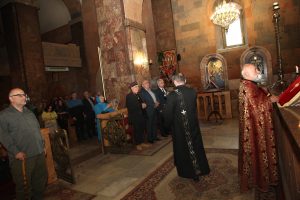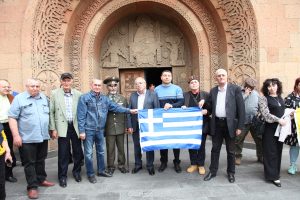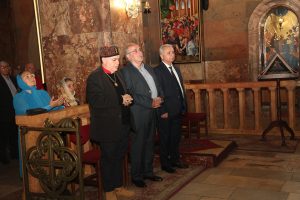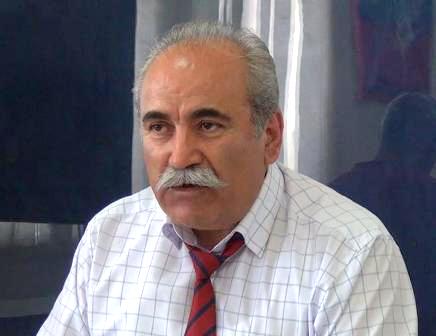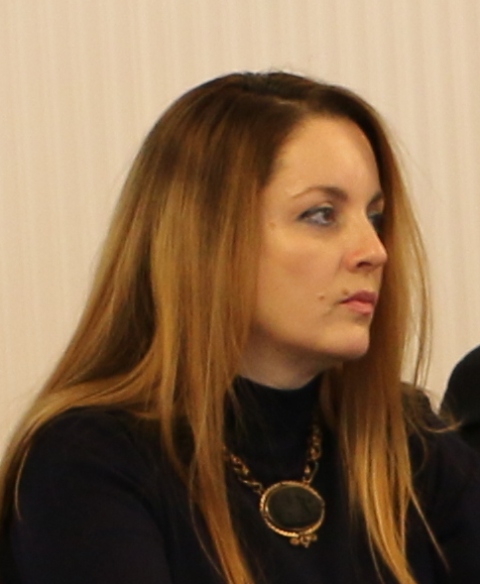 32 years have passed since the Phoenix Greek Society of Armenia, renamed to the Patrida organization, appealed to the authorities of the Soviet Armenia, and subsequently to the leadership of the Republic of Armenia, with a request to recognize the genocide of the Greeks in Turkey. We did not make a distinction on the territorial place of residence of the victims of this crime. For us, the dead were native Greeks – from Pontus, Kars, Smyrna, Constantinople and many other regions of today’s Turkey.
32 years have passed since the Phoenix Greek Society of Armenia, renamed to the Patrida organization, appealed to the authorities of the Soviet Armenia, and subsequently to the leadership of the Republic of Armenia, with a request to recognize the genocide of the Greeks in Turkey. We did not make a distinction on the territorial place of residence of the victims of this crime. For us, the dead were native Greeks – from Pontus, Kars, Smyrna, Constantinople and many other regions of today’s Turkey.
When we remember the genocide of the Greeks and Armenians, we are obliged to honor the memory of various nations and nationalities that lived in Turkey. Unlike the Turks, we realize that the genocide of peoples is one of the dark pages in the history of the Turkish people and of its statehood.
The French publicist Henri Barbé, who visited Anatolia in 1916, would write in his travel notes: “Anyone who is passing through the deserted Armenia now cannot help but shudder, these endless distances of ruins and death speak so unusually much. There is not a single tree, not a single cliff, not a single piece of moss that has not been defiled by the streams of spilled blood. There is not a single river or river that would not carry hundreds of thousands of dead bodies to eternal oblivion. There is not a single abyss, not a single gorge that would not be open-air graves, in the depths of which open piles of skeletons would not be seen white, since almost nowhere did the murderers give themselves neither the time nor the trouble to bury their victims.”
According to the English historian, Doctor of Philosophy Herbert Adams Gibbons, “the program of eviction of civilians to Mesopotamia was even more monstrous. There was no exception for either sick or pregnant women. They were not allowed to take anything with them. And these unfortunate people had to walk for 5-6 weeks under the scorching sun. Old people, sick people and children fell down on the road and never got up again. Women who were in prenatal labor were forced to move forward with whips. And when childbirth took place on the move, a bloody woman with a stillborn child was left to die in the dust. Who of these people could, committed suicide. Distraught mothers hit their babies on the ground to put them out of their misery. Hundreds of thousands of women and children died on the road from hunger and thirst.”
It was a tragedy not only for Armenians and Greeks, but also for all those whom the rulers of the Ottoman Empire decided for political reasons to either destroy or evict from the empire, which by historical right belonged to the peoples being destroyed.
Could all this not have happened? In other words, could genocide have been avoided? Are the peoples who were subjected to genocide to blame for the destruction? These questions always arise where there is still a naive notion that the genocide was connected with the form of behavior of the Greeks, Armenians, Macedonians, Assyrians, Kurds and other peoples that the Turkish authorities decided to get rid of. Allegedly, if these peoples were more modest, more peaceful, more loyal and if they did not take up arms, there would be no genocides. In other words, the hatred of the peoples subjected to genocide is the fault of these peoples themselves. But in reality, the bearer of the genocide of all the indigenous peoples turned into national minorities of the Ottoman Empire was exclusively the Turkish side. The genocide was politically predetermined regardless of the form of behavior of the victims. The genocide of the peoples of the Ottoman Empire could not be prevented, because it is an integral part of Turkish political culture.
Regardless of the death of millions of people, a wave of hatred rose everywhere throughout Turkey, trying to implement monstrous programs known only to the leadership of the empire, serving only the goals known to them. That’s how the first killing machine was created in the twentieth century, which later, in the twenty-first century, in fact, was reanimated already in the Middle East by many terrorist organizations. For the Turkish leadership, countries and peoples do not matter. For them, when achieving their goals, countries and peoples are only the source material.
For many years, Turkey has been arguing over a number of issues, including the status of islands in the Aegean Sea. Not so long ago, Turkish President Recep Tayyip Erdoğan threatened Greece with Typhoon ballistic missiles. The answer to Erdoğan did not take long to wait. The Greeks, represented by Prime Minister Mitsotakis, replied succinctly: “Our response to Turkey is our vigilance, the strengthening of the armed forces, our international alliances, but above all the unity of our people. So let the neighbors stop this anecdotal fireworks of threatening statements against Greece, designed for the domestic consumption of the Turkish public. They do not frighten us and cannot shake us. In the end, the threats that are being heard on the other side of the Aegean Sea are answered by a phrase that sums up the strength of our nation: “Ohi, Mr. Erdoğan!”. And I will say this in the language that perhaps he understands best: stop joking with Greece. Bravo, Mr. Mitsotakis!
And yet, as they say, murderers have no nationality. You can agree with this if the crime was committed on a household basis. But when there is a systematic, state-organized mass murder of civilians on a national basis, it would be blasphemy before the memory of the murdered Armenians, Greeks, Assyrians, Kurds and other peoples not to mention the nationality of the murderers.
In the language of international law, an organized mass murder committed by one nation against another is qualified as genocide. According to the great Christian wisdom reflected in the laws of European countries, the murderer is not deprived of life, but is given the opportunity to save, if not the body, then at least the soul. Even the most terrible crime can be, if not forgotten, then forgiven if the offender realized the gravity of the act he had committed and repented. In Christianity, this gives him a chance to save his soul, I think that this issue is sufficiently covered in the surahs of the Koran. For more than a century, Turkey has had the opportunity to repent, but it not only denies the monstrous atrocities committed by it, but also continues to implement a policy that, in essence, differs little from the policy of the Ottoman Turks.
With this approach to its own history, Turkey, of course, could not do without major falsifications. In order to whitewash themselves, in 1931, by order of Kemal Ataturk, a decree was issued on the creation of the “Turkish Historical Company”, which included Turkish and engaged foreign historians, including historians of the USSR, whose successor today is the Russian Federation. Historians were given an order to clean the archives, falsify the old and fabricate a new history of the peoples who lived under the Ottoman yoke. Of course, the archives can be cleaned up, but how to explain the disappearance of millions of Armenians, Greeks and Assyrians from the territory of Turkey? Did these peoples voluntarily decide to leave their homeland, their homes and temples, voluntarily subject themselves to assimilation?
After all, their disappearance is the most convincing proof of the fact of Genocide. The refusal to recognize the Genocide of the peoples who inhabited Ottoman Turkey puts the Turkish leadership and the Turkish people outside the global consensus on crimes against humanity.
It is difficult to imagine what Europe would be like today if it were not for the crushing defeat of the Turks at Vienna in 1683 – the same one that marked the beginning of the end of the Ottoman Empire. It seemed that Austria was doomed, and the Turks would begin a new large-scale expansion into Europe. But there were also those who did not think so. Among them was the King of the Polish-Lithuanian Commonwealth, Jan III Sobieski, who had his own accounts with the Turks. The Battle of Vienna took place on September 12, 1683, after a two-month siege of Vienna, the capital of Austria, by the troops of the Ottoman Empire. The victory of the Christians in this battle stopped the Ottoman Empire’s wars of conquest on the European soil, and Austria became the strongest power in Central Europe for decades.
Today, Turkey has resorted to a new expansion against Europe, populating European countries with crowds of radical Muslims. Will Europe come to her senses?
With us are God and the memory of our ancestors …
May 19, 2023
Eduard Polatov (Eduardos Polatidis)
Chairman of the Organization of Greeks of Armenia and Artsakh “Patrida”,
Member of the National Assembly (Parliament) of Western Armenia,
Chairman of the patriotic organization of war veterans “Talish – border settlements”, veteran of the Artsakh war, human rights activist
